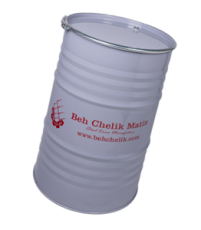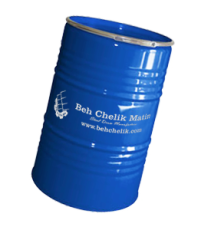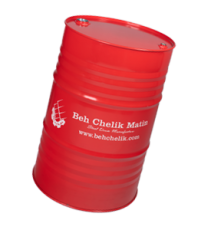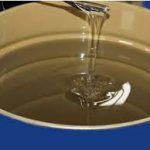Sealing of steel drum lids
What is plastisol?
Plastisols are compounds made with PVC resin, a dioctyl phthalate replacement plasticizer that provides flexibility and durability, and other additives such as calcium carbonate, epoxidized oil, stabilizers, dyes, etc
Some of the properties of plastisols are as follows:
Plastisols, often made from polyvinyl chloride (PVC), have unique properties that make them suitable for a variety of applications Here are four salient properties of plastisols:
- Flexibility: plastisols are very flexible and can be molded into different shapes
- Durability: After hardening, these materials have a high resistance to frazzle and tear
- Heat resistance: plastisols can be heated up to a temperature of about 177 degrees Celsius and turn into a gel with high viscosity
- Insolubility in water: Plastisol inks do not dissolve in water and do not dry out even if left on the screen for a long time
These properties make plastisols very useful for use in various industries, including fabric printing and toy making.


Essential standards for sealing steel drum lids
Steel drums are one of the main components of modern industry, widely used for storing and transporting various goods, including hazardous materials. Sealing of steel drum lids is crucial for ensuring the safety, integrity, and compliance of these containers. Here, we examine the key standards and best practices for sealing steel drum lids to ensure that these lids meet industrial needs and provide reliable performance in various applications.
Legal frameworks and standards for Sealing of steel drum lids
1.United Nations Recommendations for the Transport of Dangerous Goods
The United Nations provides a globally recognized framework for the transport of dangerous goods. These recommendations set criteria for packaging, including steel drums, to ensure that these containers can withstand the rigors of transportation. For steel drum lids, this includes specific guidelines for sealing mechanisms to prevent leakage and contamination.
2.Department of Transportation (DOT) Regulations
In the United States, the Department of Transportation has strict regulations for the transportation of hazardous materials. Steel drums must pass specific performance tests, including leak tests and hydrostatic pressure tests, to be certified for use. Sealing of steel drum lids is a critical aspect of these tests, as any sealing defects can lead to non-compliance and potential safety hazards.
3.ISO Standards
The International Organization for Standardization (ISO) sets international standards for steel drums, including ISO 15750, which specifies design and performance requirements for drums used in the transport of dangerous goods. These standards include detailed specifications for sealing mechanisms to ensure the drum’s durability under various conditions.
Key mechanisms of steel drum lid sealing methods
Gasket Materials
The choice of gasket materials is crucial for ensuring proper sealing. Common materials include rubber, polyethylene, and other elastomers that provide a tight seal and resist chemical degradation. Materials must be compatible with the drum’s contents to prevent reactions that might compromise the seal.
Adhesives and Sealants
In some cases, adhesives and sealants are used to reinforce the seal. These must be carefully selected based on chemical compatibility and the ability to withstand environmental conditions such as temperature changes and UV light.
4.Inspection and Maintenance
Regular inspection and maintenance of drum seals are essential for continuous safety and compliance. Inspections should include checking for signs of wear, corrosion, or damage to sealing components. Maintenance procedures may involve replacing gaskets or reapplying sealants as needed.

Performance Tests for Sealing of Steel Drum Lids
To ensure the reliability of steel drum seals, performance tests are mandatory. Key tests include:
Leak Test: This test involves filling the drum with water or another test liquid and pressurizing it to check for leaks. The seal must show no signs of leakage to pass this test.
Hydrostatic Pressure Test: The drum is subjected to internal pressure to simulate conditions it may encounter during transportation. The seal must remain intact under this pressure.
Drop Test: Drums are dropped from a specified height to assess their impact resistance. The seal should not fail or leak due to the impact.
Stacking Test: Drums are stacked to a certain height and remain so for a specified period to evaluate the structural integrity and seal reliability under the weight pressure.
At Beh Chelik Matin, all necessary tests are thoroughly conducted before shipment to ensure the product’s quality, delivering the final product to the customer with the highest quality.

Conclusion
Sealing steel drum lids to comply with industrial standards requires a comprehensive understanding of legal requirements, suitable materials, and rigorous testing. By adhering to these standards, manufacturers can ensure the safety and integrity of their steel drums, protecting their contents and the environment. Regular inspections and maintenance further ensure that these seals remain effective throughout the drum’s lifespan, providing assurance to all stakeholders involved in the storage and transportation of goods.
Order registration
With more than a 20-year of experience, relying on its technical knowledge and expert staff, Beh Chelik Matin company has been able to manufacture high-quality steel drums to meet the needs of various industries. Compliance with all necessary standards to produce quality products is our main priority to meet all needs of customers. Respected customers can place an order by informing the sales experts about the weight or thickness of the drum sheet and the appearance specifications such as its color, required printing type and inner coating .
Share us.
Products manufactured by Beh Chelik Matin Steel Drum Manufacturing
Get familiar with metal barrel specifications and standards via Beh Chelik Matin company
To get advise on the price of the drum and your desired features of your order from the Beh Chelik Matin collection ,contact the commercial team of the company.
Some industries related to steel drums
Drug drums are a vital component in the pharmaceutical packaging industry. Their robust construction ensures the integrity and safety of contents during storage and transportation. These drums are often covered with a protective coating to prevent any possible reaction between the metal and the drug.
Steel drums with closed doors are very suitable for packaging materials such as glue and resin due to their resistant structure and variety of sizes. These drums, which are made of high quality steel or plastic, can protect resin and glue against chemical and physical factors and prevent changes in the quality of the materials inside them.
Steel drums play a vital role in the food industry. Their sturdy and versatile construction makes them ideal for storing and transporting a variety of food products. However, ensuring the safety and quality of food products stored in these drums requires compliance with strict standards and regulations.
Industrial waste drums play an important role in the management and disposal of waste produced by various industries. Choosing the right type of drum, especially steel drums, ensures that safety, durability and compliance with legal standards are maintained. Here are the standards required for industrial waste drums…
One of the most important topics in lubricants that affects the quality, safety and longevity of the product is packaging. Steel drums are the preferred choice for packaging lubricants due to their strength and protective properties. To ensure optimal performance, a steel drum for lubricant packaging must have certain characteristics.








